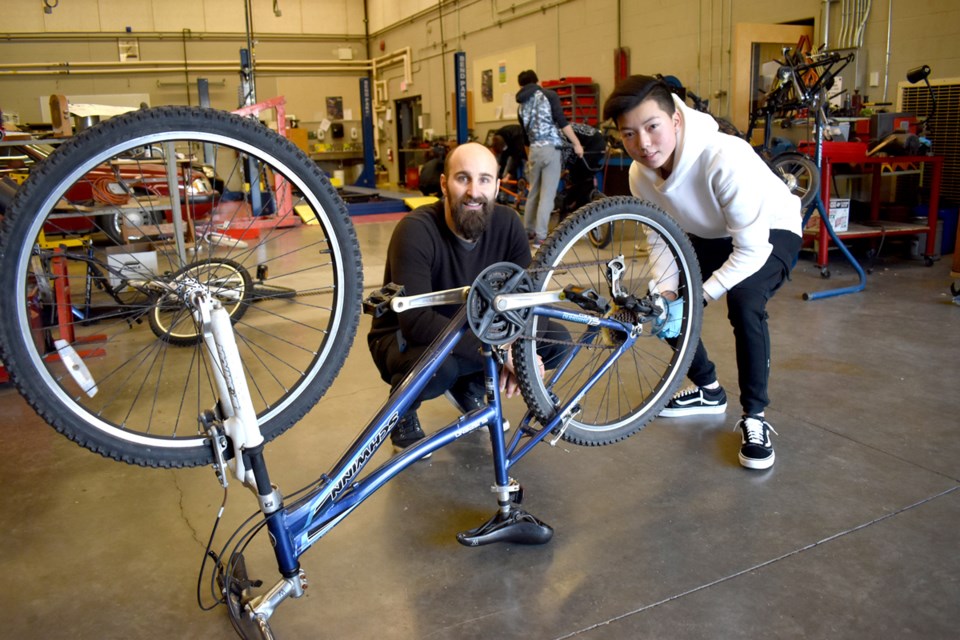Students at Steveston-London were tinkering away on a half a dozen bicycles in their shop class on Tuesday morning — and the fruits of their labour will benefit recently arrived refugees in Richmond.
After a settlement worker, Inas Elmenbbawi, told tech teacher Simon Nowak how refugees were struggling to get around Richmond — often the affordable housing they find is in rural areas of the city — Nowak fixed up an extra bike he had and Elmenbbawi delivered it to a family.
Nowak was then working at McNair but he has since moved to Steveston-London.
So far over the past couple years, 17 bikes have been delivered to refugee families — some are being used by kids to get to school, others by adults to do grocery shopping, but some smaller bikes have been fixed up so kids can have fun riding around their neighbourhood with their Canadian peers.
Nowak’s transportation class is currently fixing up six more to give out to needy families.
As part of the transportation class, students learn about aviation, cars, small engines and bikes.
In the bike component, they learn about brakes and brake levers, bearings, oiling and greasing bike parts and other basic bike repairs. But they are also learning to give back to the community — fixing bikes is just one project tech students do in the community, Nowak said.
“The kids just seem to like not doing something only for themselves - they’re doing some good,” Nowak said.
The bikes were just one need identified by settlement workers who work throughout the school district to help students and families arriving in Canada.
Nine settlement workers and two youth workers, funded by the federal government, work within the Richmond School District with about 2,500 newcomers a year.
Their initial point of contact is the kids, for whom they will often do a language assessment, but their mandate is a “family-support model,” whereby they make sure the whole family is supported and has what they need to get settled into their new home, explained Rebeca Avendeno, manager of the Welcome Centre at the Richmond School District.
With refugees, this often means starting from scratch, so the help they provide is sometimes as basic as clothing and household items, she added.
“If we support the parents and the kids can have a nice, safe home, they can have food and they can have clothing, then they’re going to do better in school,” Avendeno said, adding “they can just focus on being kids and learning.”
Part of the work settlement workers do is to help newcomers develop and build relationships with people from their ethnic background, as well as help find sports and extracurricular activities for the children. But they also help the parents learn about employment services, housing, banking and the healthcare system.
Avendeno estimated about 250-300 refugees come to Richmond every year, but because it’s so expensive in the city, they tend to move out farther after initially landing here.
“Unfortunately our housing situation doesn’t support a lot of families,” she said.
But refugees are only about 10 per cent of the families settlement workers support. Other families might arrive with their financial situation in better shape than refugees, but they still have challenges settling into a new country.
Some are single parents, others come on work permits and or post-graduate students – many are trying to figure out what resources are available to them.
“We work with a broad range,” Avendeno said. “Sometimes, families struggle with issues that money doesn’t solve.”
The settlement worker program is fully funded by Immigration, Refugees and Citizenships Canada and the contract held by the Richmond School District.



